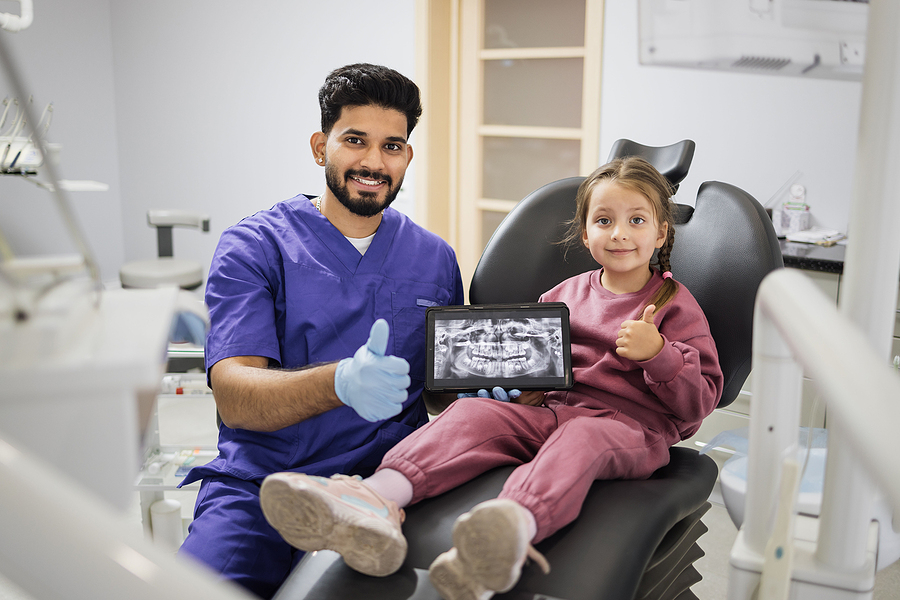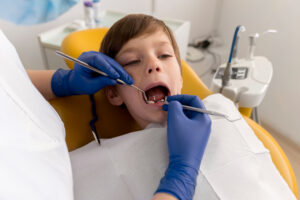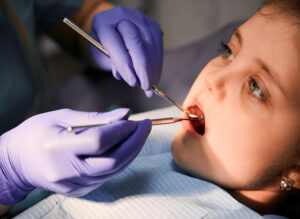Every parent wants to ensure their child’s teeth are healthy and strong. Regular dental check-ups play a crucial role in achieving this by preventing dental issues and ensuring proper growth and development of a child’s teeth. However, many parents are unsure about how often their kid’s dental visits should be scheduled.
Why Regular Kids Dental Visits are Crucial
Early Prevention and Detection
Children’s teeth are more susceptible to decay than adult teeth. Regular dental visits allow dentists to detect early signs of tooth decay and other dental problems before they become more serious. Early detection means easier treatments and better oral health outcomes.
Development Monitoring
As children grow, their dental needs change. Dentists monitor these changes and ensure that issues such as misalignments or improper bites are addressed early. Regular check-ups support the normal development of teeth and jaws and can guide decisions about potential orthodontic care.
Habit Formation
Regular kid’s dental visits help instill good oral hygiene habits from a young age. Dentists not only provide professional cleanings but also offer valuable advice on daily care such as brushing, flossing, and choosing the right dental products. This education helps children develop routines that prevent future dental issues.
Dental Health and Overall Well-being
Poor dental health can affect more than just the mouth. It has been linked to other health problems, such as diabetes and heart disease. Maintaining oral health through regular dental visits is essential for overall well-being, and teaches children the importance of taking care of their bodies.
These visits are more than just a routine check; they are a foundational part of a child’s health care that can have lifelong benefits. Understanding and maintaining the recommended schedule for these visits is key to a healthy, happy childhood.
Recommended Dental Visit Frequency for Children
Determining the right frequency for kids’ dental visits can depend on several factors, including the child’s age, oral health status, and risk of dental disease. Here are the general guidelines recommended by dental professionals:
Infants and Toddlers (up to 3 years)
The first dental visit should occur when the first tooth appears, usually around six months of age but no later than the child’s first birthday. These early visits are mostly informational, helping parents learn how to care for their child’s teeth and identify any early signs of problems. After the initial visit, toddlers should see the dentist every six months unless advised differently due to specific dental or health issues.
Preschoolers (3 to 5 years)
At this stage, children should continue visiting the dentist every six months. These visits often include a gentle cleaning, which helps prevent cavities and gum disease, and fluoride treatments if necessary. The dentist will also educate children on brushing techniques as they become more capable of handling a toothbrush.
School-aged children (6 years and older)
As children enter school age and beyond, continuing regular six-month dental check-ups is crucial. This period involves the loss of baby teeth and the emergence of permanent teeth. Regular visits allow the dentist to monitor these changes and intervene with orthodontic care if necessary. Additionally, sealants might be recommended to protect the chewing surfaces of the back teeth where decay occurs most often.
High-Risk Children
Some children may need more frequent dental visits. This includes children with a high risk of tooth decay, unusual growth patterns, or those who show signs of orthodontic problems. The dentist might recommend more frequent check-ups and treatments for these children to manage their specific needs effectively.
Regular dental check-ups are not just about fixing problems; they are about preventing them. By adhering to these guidelines, parents can ensure their children maintain optimal oral health as they grow. Each visit reinforces healthy habits and provides professional oversight to catch and address potential issues early.
What Happens During a Pediatric Dental Visit?
Understanding what to expect during a dental visit can help both children and parents feel more comfortable and prepared. Pediatric dental check-ups typically include several key components:
Examination of Oral Health
The visit starts with a thorough examination of the child’s teeth, gums, and mouth. The dentist checks for signs of decay, and gum disease, and evaluates the child’s bite and jaw alignment. This assessment helps identify any issues that might require attention, even examining areas where the child might not yet have teeth.
Teeth Cleaning
Professional cleaning is a staple of a dental visit and goes beyond what can be achieved with brushing and flossing at home. The dentist or dental hygienist will gently clean the teeth to remove plaque and tartar buildup that can lead to cavities and gum disease. They also polish teeth, which helps remove stains and smooths the surface of the teeth, making it harder for plaque to adhere.
Fluoride Treatment
After cleaning, a fluoride treatment may be applied. This treatment helps strengthen the enamel on the child’s teeth, making them more resistant to decay. Fluoride is a natural mineral that supports healthy tooth enamel and fights the bacteria that harm teeth and gums.
Education and Guidance
A significant part of a pediatric dental visit involves educating children and parents about proper oral hygiene practices. The dentist will demonstrate effective brushing and flossing techniques and discuss the best oral hygiene tools for children. Additionally, dietary advice may be offered, including which foods to avoid and healthy snack options that promote good dental health.
X-rays (if necessary)
Depending on the child’s age and dental health, the dentist might recommend taking X-rays to get a better view of the jaw and teeth beneath the gums. This can help the dentist see if there are any hidden problems, such as cavities between the teeth or issues with the way the adult teeth are growing.
Tips for Preparing Your Child for a Dentist Visit
Preparing your child for a dentist visit is key to ensuring a smooth experience and fostering a positive attitude toward dental care. Here are some practical tips to help your child feel more comfortable and reduce any anxiety associated with kids dental visits:
Discuss the Importance of Good Oral Health
Talk to your child about why going to the dentist is important. Explain that the dentist helps keep their teeth strong and healthy so they can eat, talk, and smile without any problems. Keep the conversation light and positive.
Role Play Before the Visit
Children often fear the unknown. Playing dentist at home can demystify the process. Take turns being the dentist and the patient with your child, using a toothbrush to simulate checking and cleaning teeth. This can help familiarize them with what will happen during the visit.
Choose the Right Time for the Appointment
Schedule the appointment at a time when your child is usually well-rested and cooperative. Avoid nap times or late afternoons if your child is less energetic or more likely to be irritable during these times.
Bring Comfort Items
Allow your child to bring a favorite toy or blanket to the appointment. Having a familiar object can provide comfort and make the dental office feel less intimidating.
Use Positive Language
Avoid using words like “pain” or “shot” that might incite fear. Instead, you can say the dentist is going to check their smile or count their teeth. Let the dental staff introduce their own vocabulary for their tools and procedures, which is often designed to be child-friendly.
Stay Calm and Supportive
Children can pick up on parental anxiety, so it’s important for you to stay calm and relaxed. Offer comfort and reassurance throughout the visit. Being supportive and showing trust in the dentist can influence your child’s perception positively.
Provide a Reward
After the visit, praise your child for their bravery. Sometimes, planning a small treat or activity afterward can give them something to look forward to, making the dental visit a more positive experience.
By preparing your child for what to expect and ensuring they feel supported, you can help make kids’ dental visits a routine part of their healthcare that they approach with confidence rather than anxiety.
FAQ
Parents often have many questions about their child’s dental health and visits. Addressing these frequently asked questions can help clarify common concerns and assist in making informed decisions about your child’s oral care.
How do I know if my child needs to see the dentist more frequently?
If your child is at higher risk for dental issues—such as having early tooth decay, a history of cavities, or orthodontic concerns—you may need to schedule more frequent visits. Your dentist can provide a personalized recommendation based on your child’s specific needs.
Are there signs of dental problems parents should watch for in children?
Yes, parents should be alert to signs like persistent bad breath, sensitivity or pain in the teeth, gums that bleed easily, or any changes in the alignment of teeth. These could indicate underlying issues that need professional attention. Also, watch for white spots or discoloration on the teeth, which can be early signs of decay.
How can dental visits help prevent future dental issues in children?
Regular dental visits help in the early detection and treatment of potential dental problems. These visits allow the dentist to apply preventive treatments such as fluoride applications or dental sealants, which can significantly reduce the risk of cavities. Moreover, ongoing education on proper oral hygiene practices during these visits reinforces good habits at home.
What should I do if my child is afraid of going to the dentist?
To help alleviate dental fears, try to schedule consistent dental visits from a young age so that your child becomes familiar with the routine. Choose a pediatric dentist who is experienced in managing anxiety in children and can create a relaxing environment. Discussing the visit positively and avoiding negative language about dental work can also ease anxiety.
Can my child eat or drink before a dental visit?
It’s generally advised to avoid eating a large meal immediately before the dental visit to prevent any discomfort while lying back in the dental chair. However, a light snack can be okay. It’s best to avoid sugary snacks or drinks before the appointment to help the check-up go smoothly and to prevent immediate dental work from being affected.
Trust Your Child’s Smile to Superkiddos Dental & Orthodontics
When it comes to ensuring your child’s dental health, choosing the right dental care provider is crucial. At Superkiddos Dental & Orthodontics in Woodland Hills, we understand the importance of a positive dental experience for your child. Our state-of-the-art facility combines advanced pediatric and orthodontic care with a fun, engaging environment that kids love.
From the moment your family walks into our office, your child is our priority. With games in the waiting room, exciting prizes, and movies during treatment, we make dental visits enjoyable and stress-free. Our experienced team is specially trained to treat children of all ages, from infants to teenagers, as well as special needs patients, ensuring personalized care tailored to each child’s needs.
We also offer comprehensive orthodontic solutions for patients from ages 7 to 70, including the latest in sedation dentistry techniques to ensure the most comfortable experience possible. At Superkiddos Dental & Orthodontics, we’re not just about providing excellent dental care; we’re about creating lasting, beautiful, healthy smiles.
We accept all private insurances and Denti-Cal and offer flexible financing options through CareCredit and in-office financing plans to make dental and orthodontic care accessible for your family.
Choose Superkiddos Dental & Orthodontics for a dental care partner committed to creating a healthy, beautiful smile that your child will carry into adulthood. Schedule your visit today and see why our patients can’t wait to come back!




